According to data from the China Passenger Car Association (CPCA), U.S. automaker Tesla (NASDAQ:TSLA) witnessed a remarkable 68.7% year-on-year surge in sales of its China-made electric vehicles (EVs) in December, totaling 94,139 units. Deliveries of the China-made Model 3 and Model Y vehicles experienced a 14.2% increase from November.
Chinese competitor BYD (002594.SZ) also reported robust growth, delivering 341,043 passenger vehicles in December, marking a 13% month-on-month increase and a substantial 45% year-on-year jump. BYD achieved a record quarter with sales of 944,779 new energy vehicles in Q4, including 526,409 pure EVs.
For Tesla, these figures contributed to its China-made sales, including exports, reaching 947,742 for the full year, representing 52.4% of the company’s global deliveries. Tesla’s Shanghai plant, its largest globally, can produce 1.1 million units of Model 3 and Model Y cars annually, supplying not only China but also countries like New Zealand, Australia, and Europe.
While Tesla set a global delivery record of 484,507 cars in Q4, surpassing market expectations, BYD secured the top spot as the leading EV maker worldwide. Tesla faces intensified competition in China, the world’s largest auto market, where a price war and slowing EV demand have led to increased rivalry among both established and new players.
To stay competitive, Tesla initiated a price war in China at the beginning of the previous year, involving over 40 brands. The company accounted for 52.4% of China-made sales for the entire year, despite facing challenges from local contenders. Additionally, Chinese smartphone maker Xiaomi entered the EV market, unveiling its first electric vehicle last week with ambitions to become one of the world’s top five automakers in the next 15 to 20 years.
Meanwhile, Huawei, a major smartphone player, has reportedly approached Mercedes Benz and Volkswagen’s Audi about potential smart car investments. In Shanghai, Tesla has acquired land for a megapack battery manufacturing plant, with production expected to commence in Q4 2024. However, the company’s ambitious plans for expanding its EV capacity in Shanghai depend on regulatory approval from Chinese authorities.
Featured Image: Pexels















